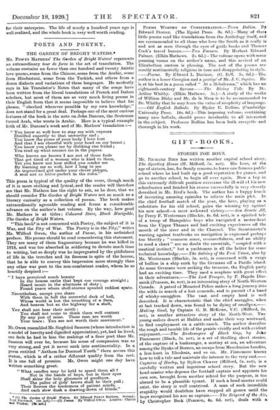POETS AND POETRY.
THE GARDEN OF BRIGHT WATERS.*
DER. POWYS Miermuts' The Garden of Bright Waters, represents an extraordinary tour de force in the art of translation. The volume contains no fewer than one hundred and twenty Asiatic love poems, some from the Chinese, some from the Arabic, some from Hindustani, some from the Turkish, and others from a dozen dialects and variations of these languages. He modestly says in his Translator's Notes that many of tho songs have been written from the literal translations of French and Italian scholars, but most of them are so very much living poems in their English form that it seems impossible to believe that his phrase, " checked wherever possible by my own knowledge," does not stand for a great deal. Perhaps one of the most curious features of the book is the note on John Duncan, the Scotsman turned Arab, who wrote in Arabic. Here is a typical example both of Mr. Duncan's work and of Mr. Mathere' translation
You know so well how to stay me with vapours Distilled expertly to that unworthy end ; You know the poses of your body I love best And that I am cheerful with your head on my breast ; You know you please me by disliking one friend ; You read up what amuses me in the papers.
Who knows ins knows I am not of those fools That get tired of a woman who is kind to them, Yet you know not how stifled you render me By learning me so well, how I long to see An impructised girl under your clever phlegm, A soul not so letter-perfect in the rules."
This poem is typical of the quality of the verse, though much of it is more striking and lyrical, and the reader will therefore see that Mr. Mothers has the right to ask, as he does, that we should consider The Garden of Bright Waters not so much as a literary curiosity as a collection of poems. The book makes extraordinarily agreeable reading and forms a considerable advance on the author's last volume. By the way, how good Mr. Mathers is at titles : Coloured Stars, Black Marigolds, The Garden of Bright Waters.
"This book, is not concerned with Poetry, the subject of it is War, and the Pity of War. The Poetry is in the Pity," writes Mr. Wilfred Owen, the author of Poems, in his unfinished preface. His poems should be read remembering this statement. They are many of them fragmentary because he was killed in 1918, and was too absorbed in soldiering to devote much time to writing, but so deeply was he impregnated by the pitifulness of life in the trenches and its fineness in spite of the horror, that he is able to convey this impression more strongly than any other war poet to the non-combatant reader, whom he so heartily despised :-
"I have perceived much beauty In the hoarse oaths that kept our courage straight ; Heard music in the silentness of duty ; Found peace where shell-storms spouted reddest spate. Nevertheless, except you share With them in hell the sorrowful dark of hell, Whose world is but the trembling of a flare, And heaven but as the highway for a shell, You shall not hear their mirth :
You shall not come to think them well content By any jest of mine. These men are worth
Your tears : You are not worth their Merriment." Mr. Owen resembled Mr. Siegfried Sassoon (whose introduction is a model of brevity and dignified appreciation), yet, had he lived, one feels he had in him the makings of a finer poet than Mr. Sassoon will ever be, because his sense of compassion was so vary strong, and yet it never sank into sentimentality. In a poem entitled "Anthem for Doomed Youth" there occurs this stanza, which is of a rather different quality from the rest. It is one full of promise. Mr. Owen might one day have written something great.
" What candles may be held to speed them all Not in the hands of boys, but in their eyes Shall shine the holy glimmers of goodbyes. The pallor of girls' brows shall be their pall; Their flowers the tenderness of patient minds, And each slow dusk a drawing-down of blinds."
.(1) The Garden of Bright Water,. By Edward Powys Mothers. OVord ..sd Blackwell. leo. net).—(2) Poems. By Wilfred Owes. London: Chatto gee Wiathis. Les. net)






































 Previous page
Previous page